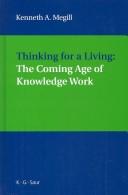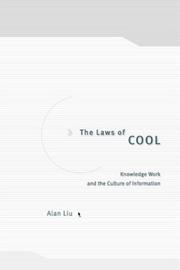| Listing 1 - 3 of 3 |
Sort by
|

ISBN: 3598116381 9786613403339 359844009X 1283403331 Year: 2004 Publisher: München Saur
Abstract | Keywords | Export | Availability | Bookmark
 Loading...
Loading...Choose an application
- Reference Manager
- EndNote
- RefWorks (Direct export to RefWorks)
Knowledge Management as a term has been around for more than a decade, but do we really know what it means? This far-reaching book tackles the thorny question of how to define knowledge management and make it work in the 21st century. It questions our beliefs in the role of the information profession, but also sets out the issues in a much wider context of different subjects and disciplines. It develops the idea of the knowledge culture and knowledge work and goes on to expand on how information needs to be shared and not hoarded as in the traditional role of libraries as keepers of knowledge.
Library management --- Breinwerkers --- Connaissance [Travailleurs de la ] --- Connaissances [Gestion des ] --- Gestion de la connaissance --- Gestion des connaissances --- Gestion du savoir --- Information workers --- KM --- Kennisbeheer --- Kennismanagement --- Knowledge management --- Knowledge workers --- Management of knowledge assets --- Savoir [Travailleurs du ] --- Travailleurs de la connaissance --- Travailleurs du savoir --- 002 --- Informatieverzorging i. v. m. documentatie --- Knowledge management. --- Knowledge workers. --- Management Theory --- Management --- Business & Economics --- 002 Informatieverzorging i. v. m. documentatie --- Employees --- Intellectual capital --- Information technology --- Organizational learning
Book
ISSN: 17814944 ISBN: 9782804166748 2804166740 2807346588 Year: 2012 Volume: *23 Publisher: Bruxelles : De Boeck Superieur,
Abstract | Keywords | Export | Availability | Bookmark
 Loading...
Loading...Choose an application
- Reference Manager
- EndNote
- RefWorks (Direct export to RefWorks)
Le monde de l'immateriel se substitue progressivement a l'univers industriel. Cet ouvrage nous aide a repenser notre maniere de construire ce nouveau monde, a travers la dynamique des differentes composantes de l'economie du savoir et de ses acteurs. Nous penetrons progressivement et durablement dans un nouveau monde immateriel ou le savoir et l'innovation sont au coeur de la croissance et du developpement economique. De nouveaux acteurs emergent et prosperent sur cette nouvelle scene de la connaissance : des travailleurs et des professionnels du savoir, des organisations intensives en connaissances, qui se localisent et fertilisent le plus souvent au sein d'agglomerations du savoir. Ils contribuent tous a alimenter cette "nouvelle economie".De maniere a apprehender au mieux cette economie du savoir et ses differents acteurs et espaces, l'ouvrage, se propose d'eclairer, de revisiter et d'approfondir le concept de savoir dans ses differentes dimensions : historique, sociologique et economique, en proposant notamment des categorisations et des grilles de lectures conceptuelles et pragmatiques pour en saisir les modes de construction, les enjeux et les perspectives.A la fois chercheur et consultant, l'ouvrage s'adresse a un large public comportant des managers, des professionnels, des consultants, des enseignants-chercheurs et des etudiants.
Breinwerkers --- Capitalisme cognitif --- Connaissance [Travailleurs de la ] --- Connaissance [Économie de la ] --- Connaissances [Gestion des ] --- Economy of knowledge --- Gestion de la connaissance --- Gestion des connaissances --- Gestion du savoir --- Industries de la connaissance --- Industries du savoir --- Information economy --- Information workers --- KBE (Knowledge-based economy) --- KM --- Kennisbeheer --- Kenniseconomie --- Kennismanagement --- Knowledge economy --- Knowledge management --- Knowledge workers --- Knowledge-based economy --- Management of knowledge assets --- Savoir [Travailleurs du ] --- Savoir [Économie du ] --- Travailleurs de la connaissance --- Travailleurs du savoir --- Économie de la connaissance --- Économie du savoir --- Économie fondée sur la connaissance --- Économie fondée sur le savoir --- Economic development --- International finance --- Développement économique --- Finances internationales --- Education --- Information technology --- Economic aspects --- Développement économique --- Education - Economic aspects

ISBN: 0226486990 0226486982 9780226487007 0226487008 9780226486987 9780226486987 9780226486994 1282901974 9781282901971 9786612901973 6612901977 Year: 2004 Publisher: Chicago (Ill.) University of Chicago press
Abstract | Keywords | Export | Availability | Bookmark
 Loading...
Loading...Choose an application
- Reference Manager
- EndNote
- RefWorks (Direct export to RefWorks)
Knowledge work is now the reigning business paradigm and affects even the world of higher education. But what perspective can the knowledge of the humanities and arts contribute to a world of knowledge work whose primary mission is business? And what is the role of information technology as both the servant of the knowledge economy and the medium of a new technological cool? In The Laws of Cool, Alan Liu reflects on these questions as he considers the emergence of new information technologies and their profound influence on the forms and practices of knowledge.
Art and technology --- Art et technologie --- Breinwerkers --- Connaissance [Travailleurs de la ] --- Cyber-médias --- Cybermédias --- Digital media --- Digitale media --- E-médias --- Electronic media --- Informatiemaatschappij --- Information society --- Information workers --- Informationsgesellschaft --- Knowledge workers --- Kunst en technologie --- Literature and technology --- Literatuur en technologie --- Littérature et technologie --- Médias numériques --- Médias sur Internet --- Médias sur le Web --- Médias électroniques --- Savoir [Travailleurs du ] --- Sociedade da informação --- Société de l'information --- Société de la connaissance --- Société du savoir --- Travailleurs de la connaissance --- Travailleurs du savoir --- Art and technology. --- Digital media. --- Education, Higher --- Humanities --- Information society. --- Internet --- Knowledge workers. --- Literature and technology. --- Popular culture --- Work --- Aims and objectives. --- Social aspects. --- History --- Education, Higher -- Aims and objectives. --- Humanities - Social aspects. --- Humanities -- Social aspects. --- Internet -- Social aspects. --- Sociology & Social History --- Social Change --- Social Sciences --- Industry and literature --- Technology and literature --- Technology --- Employees --- Intellectual capital --- Sociology --- Information superhighway --- Learning and scholarship --- Classical education --- New media (Digital media) --- Mass media --- Digital communications --- Online journalism --- Technology and art --- Aims and objectives --- Social aspects --- Education [Higher ] --- 20th century
| Listing 1 - 3 of 3 |
Sort by
|

 Search
Search Feedback
Feedback About UniCat
About UniCat  Help
Help News
News